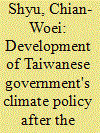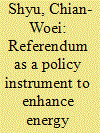|
|
|
Sort Order |
|
|
|
Items / Page
|
|
|
|
|
|
|
| Srl | Item |
| 1 |
ID:
132668


|
|
|
|
|
| Publication |
2014.
|
| Summary/Abstract |
Given its limited involvement in and recognition by international organizations, Taiwan is not presently a signatory to the United Nations Framework Convention on Climate Change (UNFCCC) or the Kyoto Protocol. The objective of this study is to analyze how and the extent to which changes in an exogenous factor, namely the Kyoto Protocol and Post-Kyoto climate negotiations, affect and ultimately lead to the formulation of and changes in the Taiwanese government×s climate policy. This study applies policy network theory to examine the development of and changes in the Taiwanese government×s climate policy. The results demonstrate that international climate agreements and negotiations play a key role in the development of, changes to, and transformation of Taiwan×s climate policy. Scarce evidence was found in this study to demonstrate that domestic or internal factors affect climate change policy. Despite its lack of participation in the UNFCCC and the Kyoto Protocol, Taiwan has adopted national climate change strategies, action plans, and programs to reduce greenhouse gas emissions. However, these climate policies and measures are fairly passive and aim to only conform to the minimal requirements for developing countries under international climate agreements and negotiations. This process results in inconsistent and variable climate policies, targets, and regulations.
|
|
|
|
|
|
|
|
|
|
|
|
|
|
|
|
| 2 |
ID:
192736


|
|
|
|
|
| Summary/Abstract |
This study explores whether energy policy-related referendum initiatives in Taiwan can serve as effective policy instruments for the public to participate democratically in the formulation of energy policy and transition. Taiwan's conventional energy policy-making process is top-down, determined by the government, politicians, and experts. This process was challenged by five bottom-up energy-related referendum initiatives in 2018 and 2021, demanding a reduction in coal-fired electricity generation, electricity generation from nuclear energy instead, and an end to the expansion of large-scale fossil fuel energy infrastructure. The preferences of the general public and government for the energy transition agenda were in conflict. The results show that referendum is an effective and socially integrated policy instrument for enhancing energy democracy and guiding governmental energy transition in Taiwan, particularly by resisting the government's dominant coal-based energy agenda and facilitating a restructuring of the energy sector against various social and contextual pressures on energy preferences and contested policy goals. This bottom-up, exogenous rather than endogenous, and forced rather than voluntary energy policy formulation model corresponds to the international discussion on how energy democracy can change traditional structural power relations between the government and citizens in energy policy formulation and transition.
|
|
|
|
|
|
|
|
|
|
|
|
|
|
|
|
| 3 |
ID:
117002


|
|
|
|
|
| Publication |
2012.
|
| Summary/Abstract |
Given the fact that 1.4 billion people, over 20% of the world's population, lack access to electricity, rural electrification remains a common challenge for many developing countries. The 'Township Electrification Program' launched by the Chinese government in 2002 is known as the world's largest renewable energy-based rural electrification program in terms of investment volume ever carried out by a country. This study gives an in-depth examination of the program implemented in two selected townships in remote of rural areas of western China. The results showed that the implementation of the program possessed a technical orientation (e.g., construction of stations, installation of systems), and underestimated the financial implications (e.g., electricity tariff, households' ability to pay electricity fees, financial management) as well as human resources available (e.g., training for operators, household participation) and institutional capacity building (e.g., good governance, regulatory framework) at the local level. Even though electricity was provided by the solar PV power stations, households still relied on traditional energy sources, such as candles and dry cell batteries, due to the fact that electricity service was unreliable and electricity supply was not sufficient for households' needs.
|
|
|
|
|
|
|
|
|
|
|
|
|
|
|
|
|
|
|
|
|